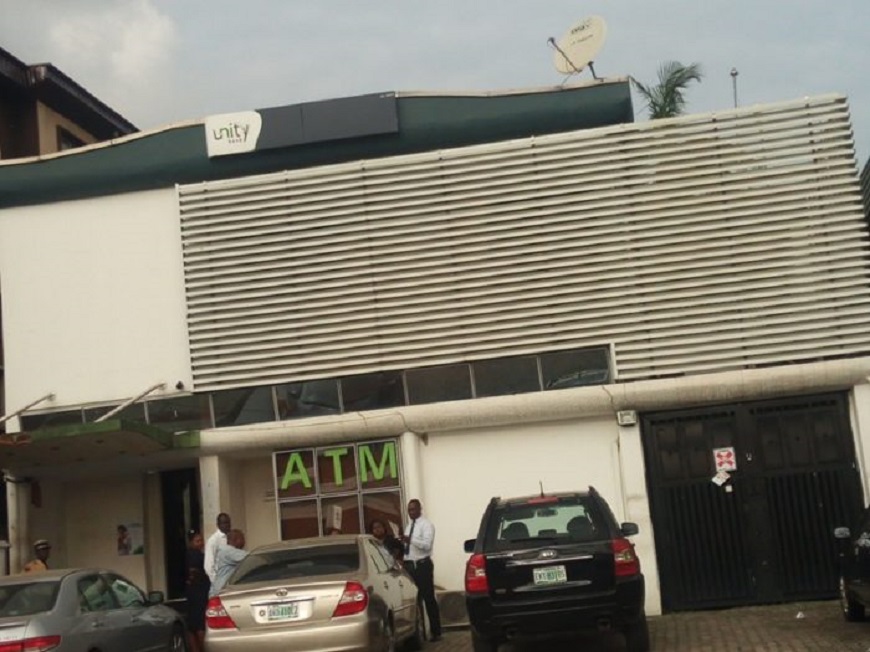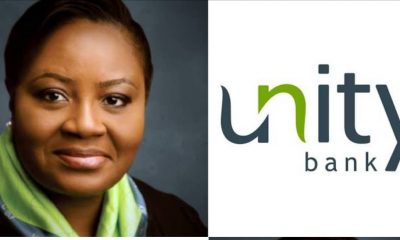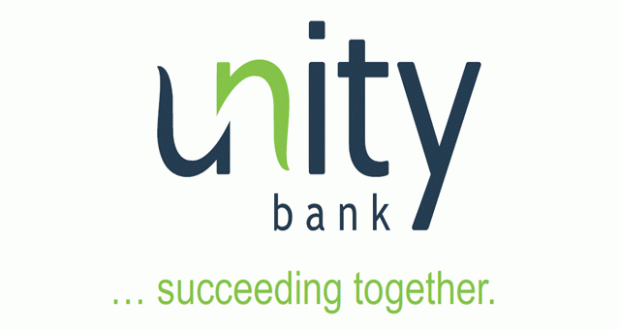Banking
FY 2018: Unity Bank Returns to Profitability, Nets N1.3bn Profit

By Modupe Gbadeyanka
After being underwater for a while, Unity Bank Plc has bounced back to profitability, its result for the 2018 financial year have revealed.
On Friday, the lender released its audited financial statements for the year ended December 31, 2018 and the balance sheet grew by 50.8 percent during the year.
The bank’s balance sheet size increased from N156.51 billion in 2017 to N235.98 billion, culminating in gross earnings of N37.33 billion for the year.
Similarly, in the period under review, the bank grew its bottom-line by 109.9 percent as Profit Before Tax (PBT) moved in a positive trajectory to close at N1.41 billion, with the bank recording a Profit After Tax (PAT) of N1.27 billion, shaking off the negative position it posted in 2017FY.
The year’s performance is supported by noticeable fundamentals derived from the bank’s corporate action to clean up its book by eliminating all the legacy non-performing loans (NPLs) which resulted in full de-risking of its balance sheet and creating a new lease of life for the Bank
A cursory review of the bank’s performance showed significant growth across key financial metrics, with Net Operating Income for the year ended December 31, 2018 growing by 112 percent to N21.63 billion from N10.22 billion in the corresponding period of 2017, Non-Interest Income also increased to N6.3 billion from N1.61 billion recorded in 2017 and earnings per share (EPS) for the year 2018 stood at N13.03k, up from negative of 127 kobo recorded in 2017 FY.
The bank’s improved performance was attributable to the reinvigorated business transformation initiatives implemented during the year, in addition to strategic corporate actions taken by the management of the bank to prioritize customer service, product delivery as well as optimize its operations for operational efficiency, thus setting a stage for its sustainable business growth model.
The bank’s strong performance feat was achieved through composite strategic focus involving the complete revamp of its service delivery channels, products revamp and profiling as well as building structured and secured operating environment to protect customers’ businesses.
In this regard, the bank, not only aggressively pushed out its USSD platform (the newly introduced customer-centric platform for easy banking), but also launched its youth-focused UniFi app – a robust omni-channel app that goes beyond banking services but also offers lifestyle services including gamification for increased customer satisfaction.
These, along with aggressive transaction push led to a 290 percent increase in non-interest income (income from transactions, cards, mobile, ATMs, commissions & fees, FX etc.).
Furthermore, the bank also optimized its operations and services through process simplification and automation while promoting cost efficiency across the entire value-chain.
The bank rolled out its Central Processing Centre (CPC) for standardized operations and operational risks mitigation thus improving service delivery to customers in the bank.
In effect, these and several modest initiatives led to the huge 17.3 percent reduction in total operating expenses and a major improvement in the efficiency ratios.
Unity Bank also leveraged on its core competence and strategic advantage in deepening its reach in Agribusiness and attendant value-chain, driving the over 360 percent growth in loan portfolio in this segment of the market.
A major feat achieved without material increase in loan quality – with NPL ratio closing the year at 0.69 percent (the best in the industry).
On cost optimization, Unity Bank’s focus yielded positive results as the lender brought down its total operating expenses by 17.3 percent from N24.46 billion in 2017 to N20.22 billion in 2018FY. This reduction is primarily as a result of the management drive to build strong processes in its operations by leveraging on key business alliances that attract better efficiency in resource allocation and growing scales in the network.
Commenting on the result, the MD/CEO, Mrs Tomi Somefun said: “The most gratifying aspect of our 2018 performance is that the bank has made a dramatic turnaround from losses in the previous year to a promising profit position in 2018FY.
“This was made possible by growth in the business throughputs and transaction-based banking with its attendant strong non-interest income.
“We equally recorded significant growth in our customer acquisition through enhanced customer-centric products that we rolled out during the year riding on our rebranded channels and platforms which were well accepted by the youth.
“We leveraged on our exceptional competencies in agribusiness and rural economy niche market which contributed to substantial growth in loans through on-lending schemes to farmers in the last quarter of 2018, all of which buoyed our performance for the year under review”.
“Also, the two-prong customer-centric banking approach being deployed to deliver quality banking services to emerging sectors in Retail/Small and Medium Enterprises and the Agricultural value chain are impacting positively on the bank’s bottom-line. In furtherance of our vision to be the Retail Bank of Choice, the bank revamped its digital strategy to provide convenient, simple and efficient platforms that are already attracting the next generation of Nigerians and expand the volume of loyal customers that have kept faith with us through the years. These are designed to guarantee double digits growth in both earnings and profits for the bank in the near future,” she stated.
The bank is aggressively and creatively pushing the frontiers of its business by creating robust platforms to support emerging digitalization of strategic businesses as well as corporate service units aimed at unlocking inherent potentials that will enable the bank effectively ride on economic headwinds and target opportunities in the markets.
Analysts are of the view that the full impact of the initiative on the account and shareholder’s value began to manifest at the fourth quarter of 2018 and early 2019, thereby gradually regaining investors’ confidence in the mid-tier lender after a period of uncertainty prevailed in the preceding year.
A statement from the bank further adds that the board of the bank expects that barring unforeseen circumstances, the trend of the results achieved in 2018 would be surpassed in 2019.
With the margins steadily looking up, the outlook for the future holds even brighter prospects for the bank even at this period that the bank closes its recapitalization programme and sets a new phase of its strategic pursuit.
The bank’s board further expects that barring unforeseen circumstances, the trend of the results achieved in 2018 would be surpassed in 2019.
Banking
CIBN to Back ACAMB on Professional Development, Industry Advocacy

By Modupe Gbadeyanka
The Chartered Institute of Bankers of Nigeria (CIBN) has promised to support the ambitious plans of the Association of Corporate and Marketing Professionals in Banks (ACAMB).
At a meeting between the leaderships of the two organisations on Tuesday, the president of CIBN, Professor Pius Deji Olanrewaju, said it was impressed with the capability development and the undergraduate mentorship schemes of ACAMB under its leader, Mr Jide Sipe.
The CIBN chief commended the forward-thinking vision of the group, saying it had raised standards across Nigeria’s banking sector.
“ACAMB’s support has given CIBN and the banking sector brand equity,” he said, praising the association’s record in reputation management. recalling ACAMB’s role in addressing crises within the sector, describing the partnership as strategic and beneficial.
He further pledged support for ACAMB’s 30th anniversary in September 2026, its AGM, and other programmes, including fundraising initiatives.
“I want to assure you that everything you have presented today has been clearly noted and will be acted upon.
“We are fully committed to working closely with you so as to translate these discussions and vision into measurable progress. Our shared goal is to strengthen the sector, protect its reputation, and enhance its public image in a meaningful and lasting way.
“This meeting discussed various initiatives and reforms crucial for the future of our industry, including the need for continuous training and adaptation to new programs,” Mr Olanrewaju stated.
Speaking at the meeting, the president of ACAMB described the visit as a crucial first step in his tenure, aimed at contributing significantly to giving flight to his vision and that of ACAMB.
“When we assumed office, one of the first things we agreed on was the need to visit key stakeholders.
“However, before reaching out more broadly, we felt it was important to begin with our primary constituency and core stakeholders. We want them to understand the direction we are taking and to support the work we are doing, so that ACAMB can achieve greater success than it has in the past.
“We couldn’t have properly started our tenure without this very important meeting with the CIBN,” Mr Sipe stated
He introduced the newly constituted ACAMB Exco, which includes the 2nd Vice President, Morolake Phillip-Ladipo; General Secretary, Olugbenga Owootomo; Assistant General Secretary, Ademola Adeshola; Publicity Secretary, Abiodun Coker; and Executive Secretary, Fadekemi Ajakaiye.
Banking
All Set for Second HerFidelity Apprenticeship Programme

By Modupe Gbadeyanka
Registration for the second HerFidelity Apprenticeship Programme (HAP 2.0) organised by Fidelity Bank Plc has commenced.
The Divisional Head of Product Development at Fidelity Bank, Mr Osita Ede, informed newsmen that the initiative was designed to empower women with sustainable entrepreneurship skills.
The lender created the flagship women-empowerment initiative to equip women with practical, income‑generating skills and structured pathways to entrepreneurship.
“HerFidelity Apprenticeship Programme 2.0 reflects our commitment to continuous improvement. Having evaluated feedback from the first edition, we have returned with stronger partnerships and deeper mentorship programmes to ensure that women acquire not just skills, but sustainable economic opportunities,” he said.
“At the heart of the programme is guided, real‑world learning. Participants will undergo intensive apprenticeship training under reputable institutions and industry experts across select fields such as hair styling, shoe making, auto mechatronics, and interior decoration,” Mr Ede added.
He noted that HerFidelity Apprenticeship Programme 2.0 goes beyond skills acquisition by offering participants a wide range of business advisory services. These include business and financial literacy training, mentorship support throughout the apprenticeship journey, access to Fidelity Bank’s women‑focused and SME financial solutions, as well as guidance on business formalisation and growth strategies.
Further emphasising the bank’s vision, Mr Ede said, “By integrating structured mentorship with entrepreneurial development, Fidelity Bank is positioning women not just as trainees, but as future employers, innovators, and economic contributors within their communities. This aligns with our mandate to help individuals grow, businesses thrive, and economies prosper.”
Banking
The Alternative Bank Opens New Branch in Ondo

By Modupe Gbadeyanka
A new branch of The Alternative Bank (AltBank) has been opened in Ondo State as part of the expansion drive of the financial institution.
A statement from the company disclosed that the new branch would support export-oriented agribusinesses through Letters of Credit and commodity-backed trade finance, ensuring that local producers can scale beyond state borders.
For SMEs, the bank is introducing robust payment rails, asset financing for equipment and inventory, and supply chain-backed facilities that strengthen working capital without trapping businesses in interest-based debt cycles.
The Governor of Ondo State, Mr Lucky Aiyedatiwa, represented by his Chief of
Staff, Mr Olusegun Omojuwa, at the commissioning of the branch, underscored the importance of financial institutions in economic development.
“The pivotal role of financial institutions to economic growth and development of any economy cannot be overemphasised. It provides access to capital, supporting small and medium-scale enterprises and encouraging savings.
“Therefore, I have no doubt in my mind that the presence of The Alternative Bank in Ondo State will deepen financial services, create employment opportunities and stimulate economic activities across various sectors,” he said.
In her remarks, the Executive Director for Commercial and Institutional Banking (Lagos and South West) at The Alternative Bank, Mrs Korede Demola-Adeniyi, commended the state government’s leadership and outlined the lender’s long-term vision for Ondo State.
“As Ondo State steps into its next fifty years, and into the future anchored on the sustainable development championed during the recent anniversary celebrations, The Alternative Bank is here to be the financial engine for that vision. We didn’t come to Akure to hang banners. We came to fund work, farms, shops, and factories.”
With Ondo State’s economy anchored largely on agriculture, particularly cocoa production, poultry farming, and other cash crops, alongside a growing SME and trade ecosystem, AltBank is deploying sector-specific financing solutions tailored to these strengths.
For cocoa aggregators, processors and poultry operators, the bank will provide production financing, facility expansion support, machinery lease structures, and structured trade facilities under its joint venture and cost-plus financing models, with transaction cycles of up to 180 days for commodity trades and longer-term structured asset financing for equipment and infrastructure.
The organisation is a notable national non-interest bank with a physical network now surpassing 170 locations, deploying capital to solve real-world challenges through initiatives such as the Mata Zalla project, which saw to the training of hundreds of women as electric tricycle drivers and mechanics.
-

 Feature/OPED6 years ago
Feature/OPED6 years agoDavos was Different this year
-
Travel/Tourism10 years ago
Lagos Seals Western Lodge Hotel In Ikorodu
-

 Showbiz3 years ago
Showbiz3 years agoEstranged Lover Releases Videos of Empress Njamah Bathing
-

 Banking8 years ago
Banking8 years agoSort Codes of GTBank Branches in Nigeria
-

 Economy3 years ago
Economy3 years agoSubsidy Removal: CNG at N130 Per Litre Cheaper Than Petrol—IPMAN
-

 Banking3 years ago
Banking3 years agoSort Codes of UBA Branches in Nigeria
-

 Banking3 years ago
Banking3 years agoFirst Bank Announces Planned Downtime
-

 Sports3 years ago
Sports3 years agoHighest Paid Nigerian Footballer – How Much Do Nigerian Footballers Earn















